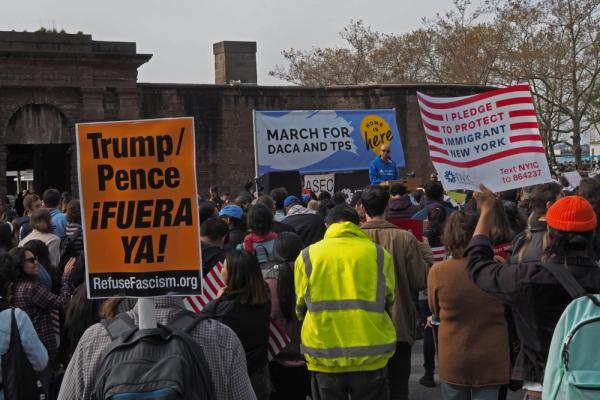WASHINGTON – Several top diplomats repeatedly warned of the consequences of rescinding legal protections for immigrants from El Salvador, Honduras, and Haiti, but the Trump administration ignored them, according to a report out Thursday from the Democratic staff of the Senate Foreign Relations Committee.
In November 2017, President Donald Trump announced he would terminate the temporary protected status of nearly 400,000 immigrants from the three countries, even though senior officials at the Department of State, Department of Homeland Security, National Security Council, and U.S. embassies in San Salvador, Tegucigalpa, and Port-au-Prince, recommended against the speed of Trump’s decision, according to memos and diplomatic cables published in the report. The officials warned the move would undermine national security and harm the safety and well-being of TPS recipients, including as many as 273,000 U.S. citizen children.
Senior Trump administration officials instead advocated for accelerating the termination of the program so that it would not become an electoral liability in 2020.
The State Department did not respond to requests for comment.
The TPS program, established by Congress in 1990, allows foreign nationals from countries devastated by war or natural disaster to live and work legally in the United States, without providing them with a pathway to residency or citizenship. TPS is revoked when government officials determine conditions in the country have improved enough to warrant sending people back home.
New Jersey Sen. Bob Menendez, the top Democrat on the Foreign Relations Committee, commissioned the report two years ago to uncover the State Department’s role in the decision. Menendez planned to send a letter to the State Department Thursday requesting a response to the findings.
Tom Jawetz, vice president for immigration policy at the Center for American Progress, said Trump’s decision was “infected by political consideration.”
“What we’re looking at here is a policy that’s popular in certain parts of the country, but overall it defies what we stand for as a nation and is undermining our national security and personal credibility,” Jawetz said.
Juan Gonzalez, a senior fellow at the Penn Biden Center for Diplomacy & Global Engagement, said the move “is not necessarily something that will address migration. It would only force people into the shadows.”
Officials cited in the report argued winding down TPS protections for El Salvador, Honduras, and Haiti should happen over a period of three years to avoid destabilizing the countries. The memos reveal political appointees keen to score a win for immigration hawks overruled these considerations and recommended a quicker wind-down period.
“We need to look at the country conditions. That is the law,” said Ur Jaddou, director of DHS Watch at America’s Voice and former chief counsel at U.S. Citizenship and Immigration Services. “But the process was completely sidelined, and it was politically motivated. Our government should not work that way.”
Jose Palma, coordinator of the National TPS Alliance, said it is time for Congress to finally recognize the contributions of TPS recipients and provide them with permanent residency.
TPS holders from the three countries can remain in the country until at least January, pending a decision in the 9th U.S. Circuit Court of Appeals.


